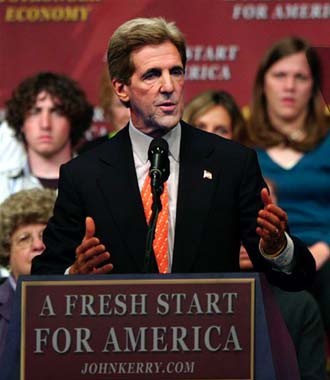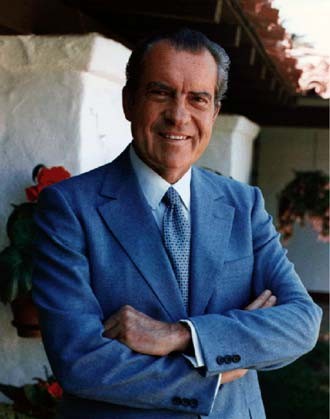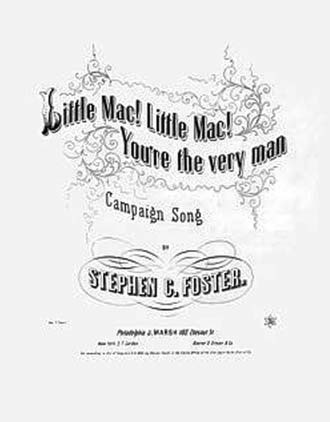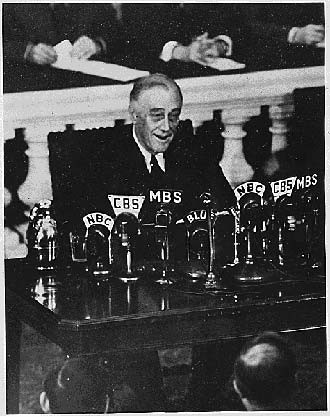|
Kerry and Bush use music to sway America's fickle heart During his recent debates with George W. Bush, John Kerry made a habit of referring listeners to his website for policy particulars. But anyone looking for the broad themes of the Kerry campaign need search no further than the two songs which blare from sound systems most often at Kerry's public appearances. Bruce Springsteen's "No Surrender," which played as the Massachusetts senator made his way to the podium for his acceptance speech at this year's Democratic Convention, reminds voters of Kerry's past as a highly decorated Vietnam vet. U2's "Beautiful Day" conveys the candidate's sense of optimism about the future. It's a theme that worked wonders for Bill Clinton in 1992, when his appropriation of Fleetwood Mac's "Don't Stop (Thinking About Tomorrow)" inspired rhythmically challenged baby boomers to get their freak on. Even the estranged members of Fleetwood Mac got caught up in the euphoria, reuniting exclusively for Clinton's 1993 inaugural. Considering the mutual contempt at the time between Stevie Nicks and Lindsay Buckingham, that merited consideration for the Nobel Peace Prize. "I think about once every generation, a campaign song clicks with the public," says Carl Leafstedt, assistant professor of music at Trinity University. "Campaign staffs are always trying to find 'the song.' Bill Clinton's song is a perfect example, because it became so closely identified with him."
Take Herbert Hoover's 1928 opus, "If He's Good Enough For Lindy." Obviously aware that Hoover possessed all the charm of a surly repo man, the song's composer shamelessly rode the coattails of America's greatest hero of the Roaring Twenties, transatlantic aviator Charles Lindbergh. As a result, Hoover is a mere afterthought in his own song, which feels more like a fantasy about the possibility of a Lindbergh presidency: "Lindbergh flew the ocean/he flew all the way to France/ most of the way he flew/he flew by the seat of his pants/good old American know-how/that's the way it ought to be/and if he's good enough for Lindy/he's good enough for me." Similarly belittled in his own theme song was Harry Truman. Notwithstanding the song's title ("I'm Just Wild About Harry,") the writer sounded less than wild about Harry, and more infatuated with Truman's predecessor, Franklin D. Roosevelt. Clinging for dear life to the Roosevelt legacy, the song condescendingly commends Truman merely for maintaining the same agenda: "FDR had his New Deal/and Harry will follow through."
If "Happy Days Are Here Again" became synonymous with the Democratic Party, the Republicans have settled for Lee Greenwood's unctuous flag-waver, "God Bless The U.S.A." Ronald Reagan - contrary to GOP hype - didn't bitch-slap Mikhail Gorbachev into submission or single-handedly salvage the free-enterprise system, but he sure gave Greenwood a mighty career boost. Until 1983, Greenwood was a dime-a-dozen country crooner on the HOV lane to Branson. After all, his biggest claim to fame had been turning down a slot in the Young Rascals. But his slightly defensive tribute to the United States (a place "where at least I know I'm free") touched Reagan, who turned it into a new national anthem for trailer-park America. The song's enduring popularity also insured that Greenwood's bearded mug would mar two generations worth of Independence Day specials. Of course, Reagan also attempted to appropriate Bruce Springsteen's bitter "Born in the U.S.A." for his 1984 campaign, which suggests that our nation's 40th president liked fat chorus hooks but kinda glazed out on the verses.
Leafstedt notes that even something as transparently uplifting as Springsteen's "No Surrender" (which Kerry cites as his favorite song) opens with a verse completely at odds with a political campaign: "We busted out of class/had to get away from those fools/we learned more from a three-minute record than we ever learned in school." "Kerry's clearly not advocating an anti-education platform," Leafstedt says, with a laugh. "But it's not going to be a perfect fit. They just want something that connects with a broad Democratic swath." At least the song seems to represent Kerry's own tastes. That's more than can be said for Bob Dole's 1996 song, "Dole Man," an embarrassing variation on Sam and Dave's Stax classic, "Soul Man." Apparently, even before he discovered Viagra, the former Kansas senator could boast: "good lovin'/I've got a truckload." In 1988, George H.W. Bush had the audacity to use "This Land Is Your Land," by leftist folk singer Woody Guthrie. It might have more effectively conveyed Bush's brand of Kennebunkport populism if the title had been changed to "This Land Is Out of Your Price Range." These days, it's common to complain about negative campaigning, but anyone who thinks that gutter-ball politics began with Lee Atwater should sample some early campaign themes. In 1840, often cited as the year that presidential campaign songs truly arrived, Martin Van Buren's theme used a deceptively serene lullaby for a knife-in-your-back lyric: "Rockabye baby/daddy's a Whig/ when he comes home/hard cider he'll swig/when he has swug/he'll fall down in a stew/and down will come Tyler and Tippecanoe."
During the Civil War, race-baiting became a common element of campaign songs. One of the most alarming examples was "Little Mac! Little Mac! You're the Very Man," a special composition by Stephen Foster, America's most esteemed 19th-century songwriter, for Abraham Lincoln's Democratic challenger, George McClellan. The song's second verse includes the following couplet: "Democrats, Democrats, do it up brown/Lincoln and his nigger heads won't go down." Another McClellan song, by John McSorley, dogged abolitionist Republicans by arguing that "while worshipping the nigger/they'd let the union slide." In anticipation of the brouhaha over George W. Bush's National Guard service, the 1888 battle between Grover Cleveland and Benjamin Harrison made an issue of military service. Harrison's theme song begins with a strangely lukewarm endorsement of his credentials: "What's the matter with Harrison?/He's all right." For all the good that did him, they might as well have written: "Why not vote for Harrison?/he rarely wets the bed."
George W. Bush has not settled on a definitive campaign song this year, but his appearances often feature Gary Glitter's "Rock and Roll Part Two," a slightly thorny choice considering Glitter's 1999 conviction for downloading child pornography. Another '70s relic, Bachman-Turner Overdrive's "Takin' Care of Business," plays over a Bush video montage at all his campaign stops. This falls into the category of belaboring the obvious. Did anyone mistakenly conclude that Bush was "takin' care of labor"? In 2000, Bush got little traction from "We The People," a Billy Ray Cyrus song (also featuring Waylon Jennings and John Anderson, among others) written specifically for his campaign. In an odd twist, Cyrus later had a change of achy-breaky heart and endorsed Al Gore, going so far as to ask the Bush campaign to stop using the song. Nonetheless, as Leafstedt notes, "The Republicans have kind of co-opted country music. You never really see the Democrats use it these days, which is pretty amazing." Maybe Republicans have grown tired of borrowing music by artists who despise them. In 1964, the Barry Goldwater campaign attempted to turn "Hello, Dolly" (a chart-topping hit that year for Louis Armstrong) into "Hello, Barry." When the show's producer, a confirmed Democrat, found out, he denied them the rights to the song, and Lyndon Johnson shamelessly ended up recasting it as "Hello, Lyndon." Reagan similarly ran afoul with Springsteen in 1984, and Bush did the same this year with Foo Fighters, prompting band leader Dave Grohl to actively support the Kerry campaign. In these uncertain musical times, however, Bush can count on one thing: He'll always have Lee Greenwood. •
|





